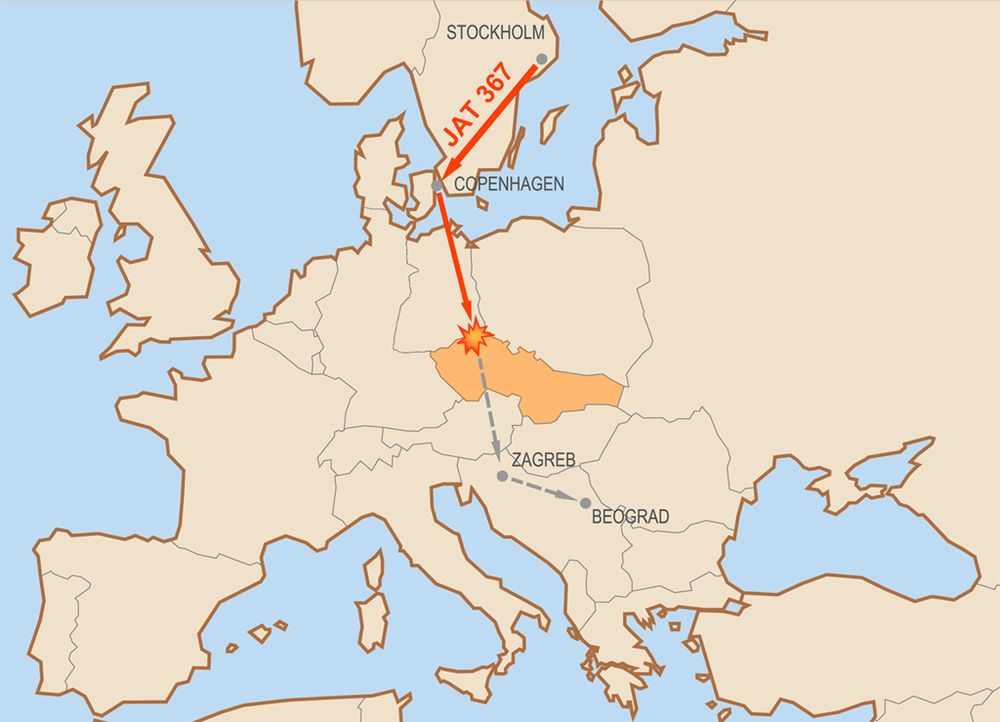On January 26, 1972, the JAT Yugoslav Airlines Flight 367 flying from Stockholm to Belgrade became the target of a terrorist attack. A suitcase bomb tucked inside the baggage compartment of the McDonnell Douglas DC-9-32 aircraft exploded when the airplane was cruising at an altitude of 33,000 feet over East Germany. The explosion tore through the fuselage of the narrow-body jetliner, breaking it apart into three pieces. The wreckage then crashed near the village of Srbská Kamenice in Czechoslovakia. Typically, there should have been no survivors, but this time around there was one—a flight attendant named Vesna Vulovic.

Vesna Vulovic.
The 22-year old Serbian flight attendant Vesna Vulovic was part of the secondary cabin crew who boarded the airplane in Copenhagen, where the flight made a brief stopover en route to Belgrade. But Vulovic was not supposed to be on the doomed flight. Vulovic’s schedule got mixed up with that of another stewardess named Vesna, and she was subsequently placed on the wrong flight. Nevertheless, Vulović was happy for the mistake because it allowed her to travel to Denmark, a country she had never been to before.
At 4:01 pm, forty-six minutes after take off from Copenhagen Airport, the bomb placed in the baggage compartment went off, and the airplane broke apart. As the cabin depressurized, the passengers and other flight crew were sucked out of the plane into freezing temperatures and fell to their deaths. Vulovic miraculously got trapped inside one of the broken sections of the fuselage by a food cart, protecting her from frigid temperatures, as it plummeted towards the ground. The fuselage section with Vulovic trapped inside crash landed in thick snow in a heavily wooded area, which cushioned the impact.

The route of flight JAT367. Image: Karel x/Wikimedia
A villager named Bruno Honke discovered Vulovic when he heard her screaming amid the wreckage. Honke had been a medic during World War II and was able to keep Vulović alive until rescuers arrived. She suffered a fractured skull, two broken legs, and three broken vertebrae, one of which was crushed completely. Her pelvis was fractured and several ribs were also broken. Her injuries resulted in her being temporarily paralyzed below the waist, and she spent several days in coma. Doctors later told her that her history of low blood pressure caused her to pass out quickly after the cabin depressurized and kept her heart from bursting on impact.
Also Read: Juliane Koepcke: The Girl Who Fell From an Airplane And Survived The Rainforest
Vulovic couldn’t remember anything about her flight and the ordeal. The last thing she remembered was greeting passengers as they boarded. The next thing she remembered was seeing her parents in her hospital room about one month later. She had to be told that she survived a plane crash, and when shown a newspaper headline by her doctor, she reportedly fainted.

Photo: CTK / Alamy Stock Photo
After several surgeries, and ten months later, Vulovic was able to walk again although the accident left her with a permanent limp. By September 1972, and less than nine months after the incident, Vulovic was eager to go back to work, but JAT gave her a desk job instead, because they didn’t want Vulovic drawing too much publicity.
Back home, Vulovic became a national celebrity and received a decoration from Yugoslav President Josip Tito. The Serbian folk singer Miroslav Ilić even wrote a song in her honor. In 1985, Vulovic ended up in the Guinness Book of World Records for surviving the highest fall without a parachute, at 10,160 meters (33,330 feet).
For decades after the crash, Vulovic struggled with survivor’s guilt. “Whenever I think of the accident, I have a prevailing, grave feeling of guilt for surviving it and I cry ... Then I think maybe I should not have survived at all,” she told The Independent in 2012. Vulovic declined therapy to help cope with her experiences and instead turned to religion, becoming a devout Orthodox Christian. She stated that her ordeal had turned her into an optimist. “If you can survive what I survived, you can survive anything,” she said.

Monument to victims of the Yugoslav aircraft tragedy of 1972, in Srbská Kamenice. Photo: palickap/Wikimedia
When she was asked whether she considered herself lucky, she replied: “No, I'm not. I'm not lucky. Everybody thinks I am lucky, but they a mistaken. If I were lucky I would never had this accident and my mother and father would be alive. The accident ruined their lives too.”
Vulovic became a political activist in later life, that cost her her job—she was fired from JAT for speaking out against Serbian statesman Slobodan Milošević and taking part in anti-government protests. She avoided arrest because the government was concerned about the negative publicity that her imprisonment would bring. She later campaigned on behalf of the Democratic Party and advocated for Serbia's entry into the European Union, which she believed would bring economic prosperity.
Vesna Vulovic died in 2016 at the age of 66.



Comments
Post a Comment